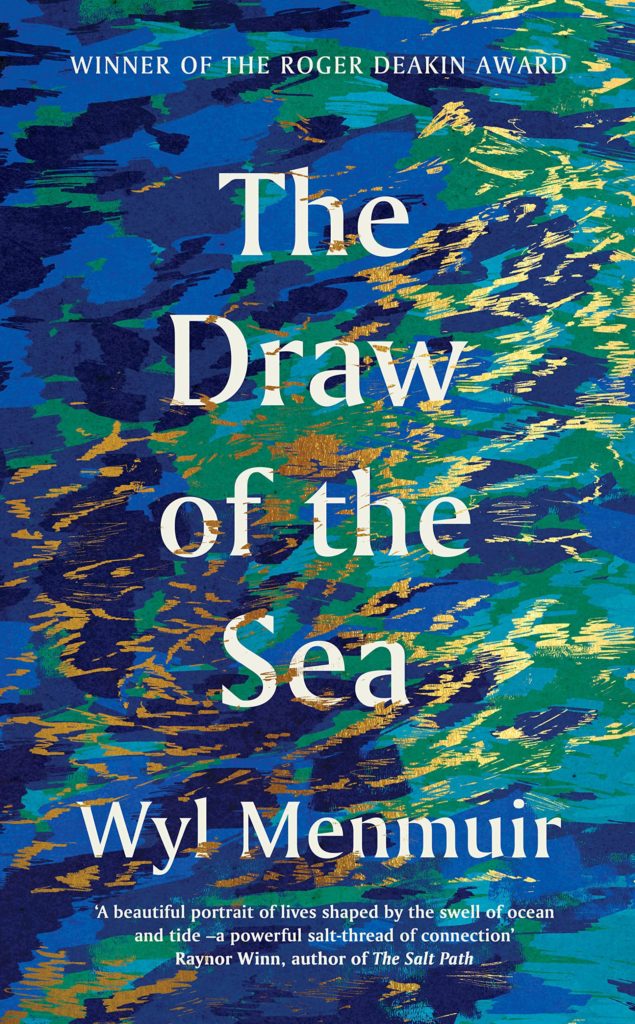Much more interesting than simply another bound-beating book about Cornwall, Wyl Menmuir’s ‘The Draw of the Sea’ is about the diverse relationships people have with the sea and the coast, writes Luke Thompson.

I am holding my breath on the sofa as I read about freediving. The laptop’s stop-clock is running. My face reddens and my wife asks if I’m okay. I hold up a finger to say I’ll be a minute. I make a minute twenty on the first go and read on.
Wyl Menmuir says he managed three.
Let’s try again. Deep breath…
I’m reading The Draw of the Sea, Menmuir’s debut book of non-fiction. The book is marketed as being about ‘the Cornish coast and the people who make their livings there’, which feels like a tried and tested sort of route, although I guess Cornwall sells this time of year.
Except this book isn’t really about Cornwall. In fact, the generalisations about Cornwall are probably the least interesting parts. For instance, there’s a bit early on where Menmuir writes how ‘In Cornwall, beachcombers are known as wreckers’. They’re not. Beachcombers are beachcombers. Wrecking is about collecting useful or valuable stuff when a ship has run aground or wrecked close to shore and the word comes with specific social, historic and cultural baggage. (See Cathryn Pearce’s Cornish Wreckers for an academic take on the topic.) Beachcombing is more leisure-oriented and desultory.
Menmuir’s idea that beachcombing-equals-wrecking comes from the Darkes — the playwright Nick Darke and the filmmaker Jane Darke — who made a fascinating documentary together called The Wrecking Season. In the documentary, Nick tracks the histories of his finds across the world in such an infectiously enthusiastic fashion that the viewer will be looking out for lobster pot tags whenever they’re at the tideline, and he says he likes to call what he does ‘wrecking’. So yes, the Darkes call it wrecking, but that doesn’t go for ‘the Cornish’.
Just a detail.
Deep breath. Take two. I’m coming for you Menmuir!
Oh, no I’m not. One minute forty. That’s good though, right?
The idea of The Draw of the Sea is much more interesting than simply another bound-beating book about Cornwall. In Wyl’s adventures — the shadow of Covid looming — he meets conservationists, surfboard designers, modern day mermaids and record-breaking freedivers. Menmuir finds a broad and diverse set of communities and cultures to explore along the coast. So this book is about the relationships people have with the sea and the coast, and it explicitly and directly explores pollution and the climate crisis as entangled within these relationships, from the small-scale fishing practice of a Scillonian lobster fisherman using handcrafted creels to the beachcombing Lego collector. He even raises the prickly question around surfing and sustainability, specifically the manufacturing of polyurethane boards.
For me, the most exciting moments are almost asides. They are the moments that are gleaned from good fieldwork and Menmuir loves getting stuck into his research. Like the scene in which we learn how the brain freeze of cold water and the silence beneath the surface makes freediving even more attractive for a mermaid with ADHD. ‘It’s like when you switch the computer off, count to ten and switch it back on again’, the mermaid says.
Like the beachcombing that recurs through this book, for the really interesting and surprising stuff to happen the researcher has to keep walking the tideline, and Menmuir has certainly put in the miles for this one.
And it seems the topic is quite timely. There are a few interesting books about coasts, islands and beachcombing, including Sally Huband’s forthcoming Sea Bean exploring the other end of the British Isles, in Shetland, and Tracey Williams’ recent Adrift: The Curious Tale of the Lego Lost at Sea. (Tracey features in Menmuir’s book too.) Has there been a shift of consciousness towards the sea? Have the confining implications of Brexit and Covid turned our collective gaze outwards, to the edges of our islands and beyond? Are we enjoying more than ever the connectivity of discovering seeds, tags and plastic octopuses that originated on the other side of the ocean?
Whatever the reasons, The Draw of the Sea is a conscientious and ecologically engaged addition to this burgeoning body of coastal works washing up on the publishing shores, so look out for a copy next time you’re poking about the bladderwrack and oarweed.
The stop-clock says two minutes. Two minutes!
Now you try.
*
‘The Draw of the Sea’ is out now and available here (£15.79), published by Aurum.
Luke Thompson is a writer and publisher from Cornwall. His latest book is the poetry collection ‘Singing About Melon’ (Shearsman). Visit his website here. Luke joins us at this year’s Good Life Experience, where he’ll be talking eels with Michael Malay. More information here.